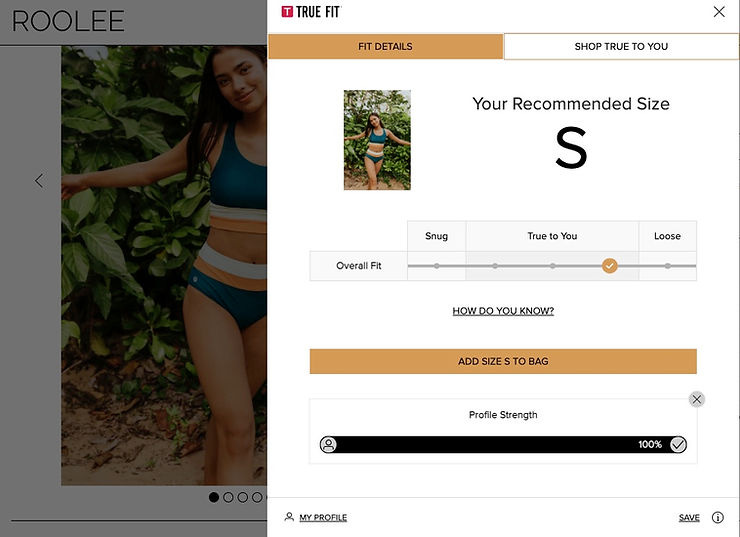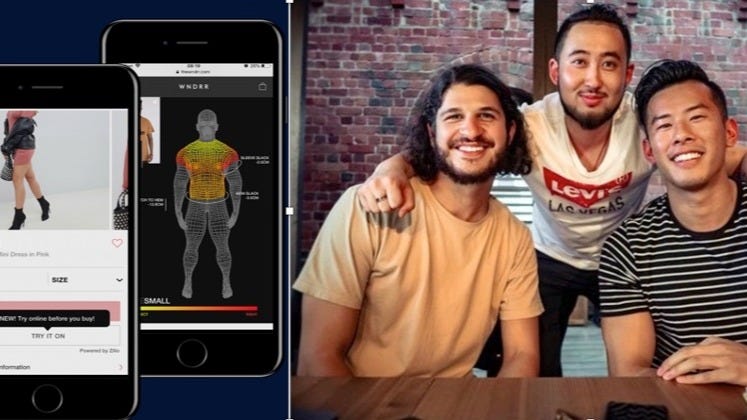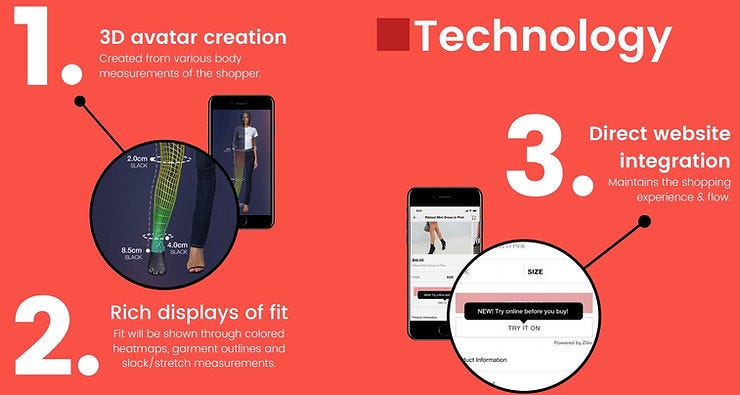Fashion Tech and ZILIO
I recently had the opportunity to learn more about the fashion technology space. Online sales will account for the lion’s share of the industry’s growth. This could present a $1 trillion problem for retailers and brands due to the increased returns from dissatisfied customers. Poor fit is a key reason for returns, and retailers are increasingly incentivised to adopt solutions to this problem, now more than ever.
Mys Tyler is pursuing a unique, community-based approach to solving this problem. Providing women with a visual representation of how clothes look on someone similar provides reassurance that the clothes will look good on them rather than just fit. These models are a diverse group of influencers or contributors who aim to build a community of women with similar body types to themselves.
Many of the other emerging solutions are more technology-based. These include fit recommendation technologies and more visual fit visualisation technologies. I am grateful for the opportunity to speak to Anthony Kwok, co-founder of online 3D fitting room ZILIO, to learn more about the space.
With the COVID-induced acceleration of online sales and evolving technology, Anthony sees this as a great time to launch his fashion technology startup. ZILIO aims to use recent technology to provide a more informative picture of fit online. However, Anthony talked about a broader, more human mission of customer empowerment through fashion. He aims to make ZILIO a shopper’s online passport or identity for fit, which will allow her or him to shop with confidence. This also makes him a brand-safe partner for retailers, and he is launching ZILIO’s MVP with renowned designer brand By Bettina Liano. ZILIO is currently raising a $600,000 seed round for an 18-month run-way. It expects to launch commercially by year-end and grow in the APAC market thereafter.
Revisiting a $1 Trillion Problem
I previously wrote about the $1 trillion problem of poor fit while profiling Mys Tyler. Recently, I've had an opportunity to learn more about the technology solutions in the space while speaking to Anthony Kwok, co-founder of ZILIO. I have included Anthony's journey in this article.
The Problem of Poor Fit
Online fashion sales accounted for the lion's share of industry growth in 2019. However, the experience of buying online has been poor. 91% of women found that the clothes they ordered did not fit as expected, and poor fit is a key reason for customer returns. Shoppers return 15-40% of online purchases compared to 5-10% of in-store purchases.
Customer returns have real consequences for brands or retailers. These include increased logistics costs, repacking and additional discounting (Gartner Research estimates less than half of returns are sold at full price). As e-commerce sales grow, this could be a $1 trillion problem.
The Emerging Solutions
Mys Tyler is pursuing a unique, community-based approach to solving this problem, and I've been thrilled with its progress over just the past few months.
Many of the other emerging solutions are based on technology. These include fit recommendation tools or fit visualisation tools built into the retailer's e-commerce website. These solutions are best illustrated with examples.
True Fit is an example of a fit recommendation tool that integrates into a retailer's website. The business was founded by Jessica Murphy and Romney Evans in 2009. True Fit has built a database of 65 million users and 12,000 brands. This database powers a fit recommendation engine that integrates into the retailer's website. It raised a Series C funding round of $55 million in 2018 led by Georgian Partners.
Customers can choose to click on a size recommendation tool on the website. They are then invited to build a personal profile with questions on their favourite brands and various body measurements. Based on this, the customer is shown a size recommendation (e.g. Extra Small, Small, Medium, Large, etc.) and how closely this size would fit them, as shown below. In this example, the tool tells me that the garment will be loose-fitting, and I may choose not to buy it, thus reducing returns. Customers can save their profile for use on other websites that integrate with True Fit.

Style.me is an example of a fit visualisation tool. These tools aim to let the customers see how the clothes will fit on an avatar\online model of themselves. It was founded in 2014 by Jonathan Leong and later, Rufus Parkinson. Like True Fit, it integrates into a retailer’s website as a sizing tool. Customers using the tool enter their information to create a virtual model, which helps them visualise the fit, as shown below

Style.me also allows customers to create their own profiles, which they can use on other websites. Interestingly, the founders have broader plans to build a community around their 3D customer profiles. This includes leveraging blockchain to create a ‘Me Token’ which will reward both influencers and consumers in their community. Creator coins using blockchain are becoming increasingly popular.
Fashion technology is still in its early stages and continues to improve. With the accelerated adoption of online retail due to COVID, retailers are increasingly incentivised to improve online sizing and customer experience. Anthony believes this will present an opportunity for ZILIO, and he shared his journey with me.
Anthony and the ZILIO Journey
ZILIO is a fashion technology startup founded by Anthony Kwok and Andrew Tuo in 2019. It is a fit visualisation tool or online 3D fitting room which helps shoppers judge how well the clothes they are browsing online will fit on their bodies. I was introduced to Anthony by Jody Dontje, a public speaking coach I met at a Startup Grind event in Melbourne.
Anthony was a professional Muay Thai fighter while studying for a Marketing and Management degree at Monash University. His professional fighting career spoke of his discipline and persistence. It also gave him a real-life lesson in marketing and branding as he successfully built a social media following, as well as obtained numerous sponsors for his fights.
Both Anthony and his friend (later co-founder) Andrew subsequently had careers in fashion retail. Anthony was a sales professional in David Jones, while Andrew worked in e-Commerce and sales in Politix. There, they experienced the issue of returns first-hand. Anthony described having to deal with dissatisfied customers returning bags full of poorly fitting clothes.
Anthony and Andrew believed there had to be a better way and looked to technology for a solution. They got accepted into the Pitchblak incubator program. This program was started by Mr Yum co-founders Kim Teo and Adrian Osman. Their mission is to help entrepreneurs avoid the mistakes they made in the early stages of their founding journeys.
After 50 interviews, they were introduced to their CTO and co-founder, Mike Pearce. Mike has over 20 years of experience as a full-stack developer, including in startups.
Similar to other technology solutions, ZILIO is looking to integrate with retailers’ websites and appear as a sizing tool, as shown below
Anthony aims to take advantage of recent technological developments to create a more informative display of fit. This includes features such as ‘heatmaps’ for fit indication and slack measurements.
However, their real mission is to empower people through fashion. Anthony passionately described the feeling of confidence and satisfaction of trying on a snug-fitting suite. He really felt for those dissatisfied shoppers he had to serve in David Jones. He hopes to allow shoppers to create a profile that they can use as a fashion passport or identity across various retailers. This will standardise the fit experience and enable them to shop with confidence.
They have validated their idea with 400 shopper interviews and were invited to participate in the Startup Bootcamp Milan, one of the world's biggest fashion technology accelerators.
To date, they have signed up 6 brands to trial their sizing tool. This includes BYBL by Bettina Liano (designer for celebrities like Madonna, Alicia Keys etc.), with whom they will be launching their MVP. Their previous fashion experience and customer-first mission made these retailers see them as a brand-safe option.
ZILIO is launching a $600, 000 seed round for an 18-month run-way. They expect to launch commercially by year-end and grow in the APAC market thereafter. I wish them the best for this process and look forward to the impact they can achieve.



